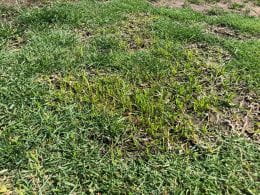Controlling Nutsedge
 When timely rainfall happens in the spring, our lawns grow quite nicely. In addition to the grass, however, summer weeds also start to appear. One of the most difficult lawn weeds to control goes by several names including nutsedge, nutgrass and water grass. The technical name is yellow nutsedge. Although this weed looks like a grass, it is really sedge, one of a group of plants that have triangular stems. As the name implies, yellow nutsedge is pale green to yellow in color. It grows rapidly in the spring and early summer, often sticking up above the rest of the lawn only a few days after mowing.
When timely rainfall happens in the spring, our lawns grow quite nicely. In addition to the grass, however, summer weeds also start to appear. One of the most difficult lawn weeds to control goes by several names including nutsedge, nutgrass and water grass. The technical name is yellow nutsedge. Although this weed looks like a grass, it is really sedge, one of a group of plants that have triangular stems. As the name implies, yellow nutsedge is pale green to yellow in color. It grows rapidly in the spring and early summer, often sticking up above the rest of the lawn only a few days after mowing.
Nutsedge grows best in moist lawns, often with poor drainage. The weed can also be introduced into better soil conditions through contaminated topsoil or nursery stock. As with many weeds, nutsedge is less competitive in a dense, healthy lawn than in a poorer, thinner turf.
Pulling nutsedge environmentally friendly but takes time
Nutsedge is difficult to control culturally because it produces numerous tubers that give rise to new plants. Pulling nutsedge will increase the number of plants because dormant tubers are activated. However, it is possible to control small stands of nutsedge by persistent pulling. Pulling will eventually weaken the plants and cause them to die out.
Using herbicides to control nutsedge
Herbicide treatments are the best way of controlling this pesky weed. There are several products available on the market. There are two common products on the market for control of nutsedge. They will have active ingredients with Halosulfuron or Sulfentrazone in them. If an infestation is not too severe, one application should take care of the problem. Be sure to read and follow all label instructions, as oftentimes it is recommended to apply when the nutsedge has reached the three-to-eight leaf stages for best results.
Since nutsedge is not a grassy or broadleaf weed but sedge many of the common herbicides on the market will have little or no effect on its control. That is why it is important to search out these products specifically developed to control sedges.
No matter what you call it, nutsedge, nutgrass or water grass, be sure to select the proper chemical and follow all label instructions for best control of this lawn weed problem.
Have questions?
The Garden Hotline is staffed by trained EMG volunteers and Extension staff who will assist you with questions.
Phone: (913) 715-7050
Email: garden.help@jocogov.org